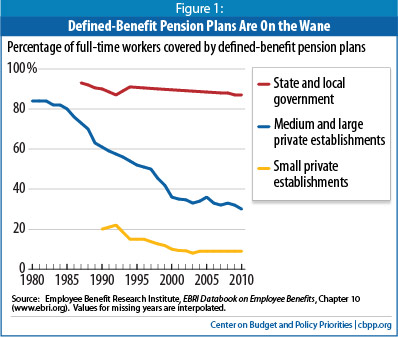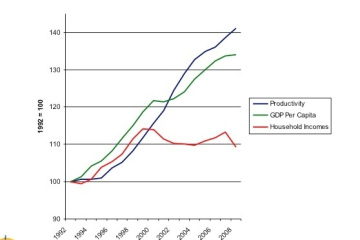Recent stories appearing in "mainstream" opinion-leader outlets would have you think that things with the economy are going great – if you didn't know better (and they don't). The thing is that outside of the geographic areas and cultural circles these opinion leaders inhabit, everyone knows better. Especially "Old Economy Steven."

The old economy collapsed because it wasn't sustainable, and to put that another way, "unsustainable" means it couldn't be sustained. And it wasn't. It didn't work then for 99 percent of us and it won't work now. We can't go back to that.
"Good News"
The economy is slowly improving. Car sales are rising, housing has "bottomed" and started back up (and is in absolute bubble-mode again in some areas), and we're actually seeing about as many new jobs as new people entering the economy! But that's it. And this has taken how many years?
These small gains are enough for our media opinion-elite to declare good times are rolling. All around us we are hearing that we are out of the woods. For example, at The Washington Post Neil Irwin and Ylan Q. Mui wrote Tuesday that the sequester's austerity (which has only partially kicked in so far) hasn't really held back the booming economy. In "The economy is holding up surprisingly well in a year of austerity,"
It adds up to this reality: In a year when tax increases and spending cuts by the federal government were expected to bleed life out of the economy, the strengthening housing and financial markets are proving to be more powerful than acts of Congress.
The "economy holding up surprisingly well" is defined in the article as "a bit better than the past few years." But The Washington Post publishes it. After all, they're in Washington. To give them credit, they do say that "the headwinds are decreasing and "would be even stronger if the federal pursestrings were not being tightened" and,
For the economy to continue growing even as the sequestration and tax increases have their full effects, higher housing prices will need to translate into more home construction, higher stock prices will need to translate into companies making new investments, and consumers’ higher level of confidence will need to translate into spending more money.
Until those things happen, there will not be the kind of full-throated economic boom that, four years since the great recession ended, America is still desperately waiting for.
Until those things happen ... But then what? Back to the same-old-same-old, a "boom" and then wait for the next crash?
Dean Baker explains some of the problem with this, in "Yet More Bipolar Economic Reporting from the Post," writing, "You get a one month jump in housing prices and suddenly the economy is booming."
The economy grew at a 2.5 percent annual rate in the first quarter. Given the economy's trend rate of growth is between 2.2-2.5 percent, this means that we were at best making up lost ground at the rate of 0.3 percent annually. The Congressional Budget Office estimates that the economy is 6.0 percent below its potential. At the first quarter growth rate it will therefore take us at least twenty years to get back to potential GDP.
Again: "At the first quarter growth rate it will therefore take us at least 20 years to get back to potential GDP." So "surprisingly well" in this case means 20 years before things get to where they should be. So .. not so much.
Others say that things are "picking up" and soon wages will, too. But wages don't "pick up" when you have an employment gap of 10 million jobs – desperate people whose unemployment checks have been cut or cut off.
Here is why elite opinion-leaders write things like this: In the D.C. area, Southern Manhattan, parts of California and other hangouts of the elite, things are good. And the booming stock market reflects this.
Most efforts so far seem to be to push us back to the "old-economy" paradigm. The elites who benefited from the old economic paradigm of sucking everything up to the top are trying to revive the old economic paradigm. But if the only input into the thinking of our leadership comes from those who got rich from that ... of course their input is going to be do more of it.
Improving, But
The economy is improving a little bit. But:
- We still have a jobs gap of around 10 million. (At the best rate in the 2000s it will take until April 2020 to close the jobs gap.)
- All the gains from economic growth are going to the top 1 percent – or fewer. (Actually worse than that, 1 percent captured 121 percent of the gains in the economy between 2009 and 2011, meaning eveyone else got poorer.)
- Wages are and have been stagnant, so the "purchasing power' of most of us continues to fall.
- Most of the new jobs are low-wage jobs. Even college grads are getting low-wage jobs, if they can find them. There are "70 percent more college grads working for the minimum wage than 10 years ago."
- College graduates are saddled with debt. It's so bad now that one-third of college grads say they regret going to college.
- 13 million homes still are "under water," many foreclosures yet to come, and many foreclosed homes are being kept off the market. There were 52,000 foreclosures last month, but before the crash the average was 21,000.
- "Getting back to normal" means we have returned to a record trade deficit with China, we are heading back toward a record deficit with the world, and it's climbing, sucking more than a billion a day out of the country.
- We have a retirement crisis, many older people have little or no savings, pensions were replaced with 401(k) scams - and D.C. is talking about cutting Social Security and Medicare?
Joshua Holland at AlterNet writes about how the retirement crisis affects families as well: "How America's Retirement Crisis Is Crushing the Hopes of a Generation of Young People,"
If you're nearing retirement age – or have a parent or grandparent nearing retirement age – you're no doubt aware of how 40 years of stagnant middle-class wages and the disastrous shift from traditional pensions to 401(k)-type plans has made a dignified retirement all but impossible for all but the very well-to-do.
...This graphic from the Center for Budget and Policy Priorities tells the tale:
"Dignified retirement [is] all but impossible," so older workers have to stay in the workforce. The result, combined with other factors increasing unemployment, is that "almost 23 percent of 18- and 19 year-olds and more than 13 percent of 20- to 24-year-olds who want to work can't land a job."
Poverty is soaring, too. Paul Buchheit explains at AlterNet, in "The Real Numbers: Half of America in Poverty – and It's Creeping Upward,"
Almost half of Americans had NO assets in 2009 ... It's Even Worse 3 Years Later ... Based on wage figures, half of Americans are in or near poverty.
The IRS reports that the highest wage in the bottom half of earners is about $34,000. To be eligible for food assistance, a family can earn up to 130 percent of the federal poverty line, or about $30,000 for a family of four.
Even the Census Bureau recognizes that its own figures under-represent the number of people in poverty. Its Supplemental Poverty Measure increases, by 50%, the number of Americans who earn between one-half and two times the poverty threshold.
Meanwhile, union power is still on the decline, resulting in wage decreases, loss of benefits, loss of rights and a continuing fall of the middle class. For example, Salon: "Report: Nearly a quarter of American workers have no paid time off." "The U.S. is the only wealthy nation that does not guarantee its workers any paid vacation time, a new report finds."
What Happened?
The Reagan Revolution happened. It took some time, but the effects of the changes in our economy are almost fully hitting us now. Some of the results of the Reagan Revolution that we are feeling:
- Crumbling infrastructure – maintenance has been deferred because that would be "government spending."
- Massive debt from tax cuts for the rich, as a strategy to force the "debt crisis" the same people are scaring us with today.
- Government defunded, devalued.
- No antitrust enforcement, so giants crushing competition became the norm.
- Solidifying fossil-fuel dominance of the economy, destroying President Jimmy Carter's efforts to move us toward green energy (symbolized by taking Carter's solar installation off the White House roof).
- Personal debt soared as wages for the rest of us fell.
- Deregulation and market-based approaches, which really means the rich and their giant corporations get to prey on the rest of us with impunity.
- Militarization of the culture.
- Vast inequality.
- Trade deals that started the offshoring of jobs and pitted our workers against exploited workers with no voice on the job or in their governments.
And then there was the Bush Boost:
- Corruption.
- Crony capitalism, "no-bid" contracts awarded to insiders.
- Rule of law mocked and forgotten. Torture.
- Endless war.
- Even more massive debt from tax cuts.
- Solidifying the transfer of manufacturing jobs, factories, supply chain and infrastructure through one-sided trade deals with no enforcement.
Michael Scherer at Time's Swampland has a chart that shows what happened: The Most Important Chart in American Politics,
The chart tracks three economic trends in the U.S. over the last two decades, between 1992 and 2009. The first two lines — productivity and per capita gross domestic product — are rising. This is the unmistakable American success story, the one reflected in record corporate profits, growing wealth accumulation and the unmatched efficiency of this country’s economy. The third line tracks median household income, as measured by the U.S. Census. It shows the story of frustration and stagnation that so many Americans long ago accepted as a reality.
I've been using a similar chart, that tracks the relationship between productivity and wages:
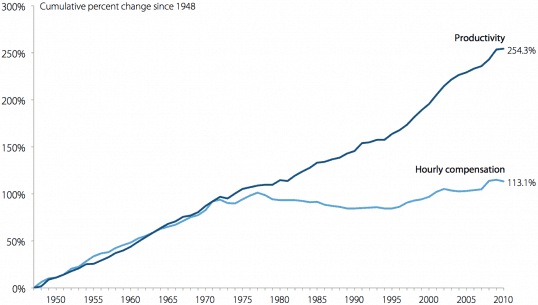
All the benefits are going somewhere, though, and this chart shows why we say the 1 percent are getting 121 percent of the gains. Where did that money go?
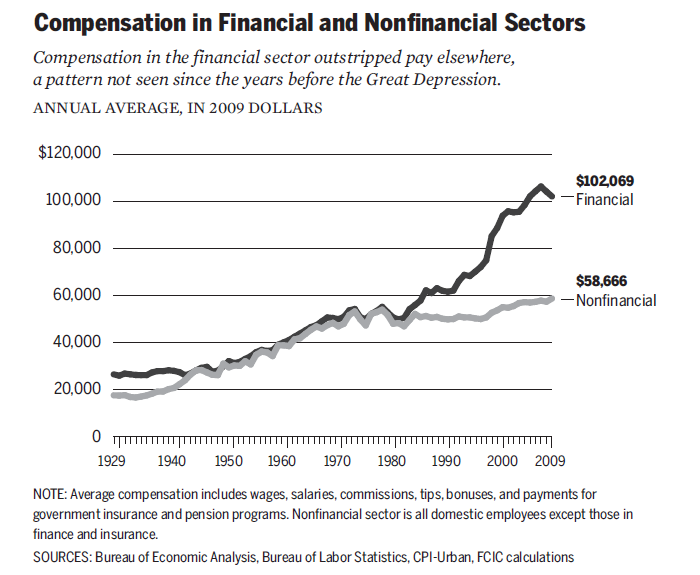
Things are great for a few, and still bad for everyone else. So this "good news" is really celebrating what many call "the new normal": a permanently bad economy. People forget what a good economy looks like, things have been so bad that sort-of-bad looks good now. A permanently bad economy is not good news, and it cannot be sustained.
We can't just return to the old economy. It wasn't sustained because it was unsustainable. It wasn't sustainable before the crash, and it is less sustainable now.
Old Economy Steve
Generation-Y millennials – people born maybe in the 80's into the 90's, now in their 20-30s – are angry. They inherited a ruined economy. The 80s Reagan Revolution is home to roost, and they get to live with and in the results. They can't get a job and the jobs a few of them can find don't pay crap.
Along comes "Old Economy Steven." Old economy Steven is a "meme" that expresses how millenials feel about older people – people from the "old economy" who had it good, and don't understand how the new economy is working for them. Steven is shown in his 70s-or-early-80's high school yearbook photo, as Jordon Weissmann explains at The Atlantic,
As a proud member of the class of 1970-something, he's got a doofy haircut straight out of "Daze and Confused," along with a sunny financial future. With commencement season drawing to a close, his awkwardly smirking face has become the canvass upon which some angry Millennials have decided to vent their frustrations with the economy, not to mention condescending Baby Boomers.
Here is what Old Economy Steven is saying about this New Ecoonomy, and it isn't that it is "picking up" as our elite opinion-leaders would have us think.
On student loans and tuition:

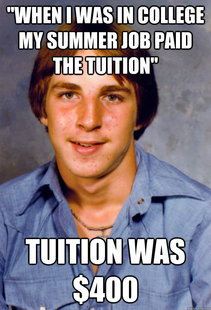
Today's job market:
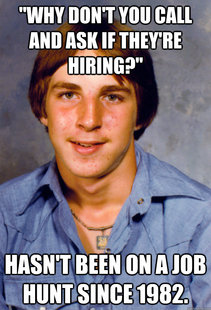
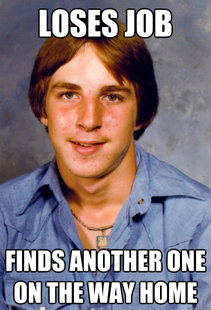

Today's wages:
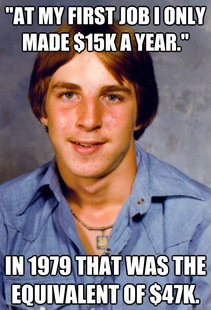
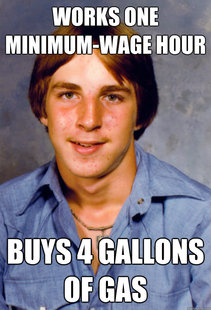
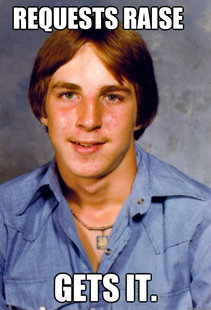
And the effect of our trade deals:
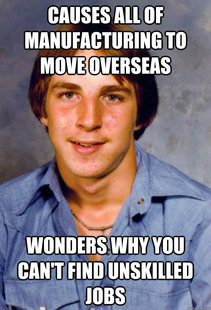
To be fair, Old Economy Steve is angry at the wrong people. Older people don't have it so good. Retirement is out of the picture for many – and D.C. types are actually talking about cutting Social Security rather than increasing it as needed. And age discrimination is not a joke:
[youtube]https://www.youtube.com/watch?v=IsaYodquXGA[/youtube]
Old Economy
The old economy is unsustainable because it is extraction-based without replacing and reinvesting. It is based on endlessly extracting resources from the planet without much concern for the damage this leaves behind. It extracts wages and benefit from working people to cut costs. It extracts short-term profits at the expense of long-term gains. But the long term does come.
It is also based on cost-shifting and externalization. Externalization is a form of cost-shifting, where you "externalize" a cost like pollution. Dumping a pollutant into the water or carbon into the air lowers your costs and boosts your profits with the larger community paying the costs.
The number-one problem with the "old economy' paradigm as far as working people are concerned is that the gains and benefits from the economy are not shared with people who work for a living.
The number-two problem with the old economy is the bigger-picture failure to reinvest in our people and their well-bring (dare I say the word, "welfare"?), our infrastructure and our economy through basic science, energy reform, etc.
A severe problem is increasing dominance by the top few, with impunity. Income and wealth inequality increases, giant multinationals use their size to crush competition, and the billionaires behind the giant corporations are crushing our political system.
We can't let the "new economy" just be the old economy, but more so.
Solutions
Some things we can do to help bring about a better economy:
- Start changing the equation of who gets what for what: Raise the minimum wage to a good, living wage and then index it to inflation. The Securities and Exchange Commission should implement the LAW that companies reveal CEO-to-worker pay ratios. Fix unemployment by direct government hiring if need be, but fix it now, to turn downward wage pressure into upward wage pressure. (See infrastructure and energy efficiency, below.)
- Increase union power. Enforce existing labor laws and expand the right to organize! Give working people the power to balance the massive, massive wealth and power off the giant corporations.
- Increase taxes at the top with new brackets, restore high estate taxes, eliminate corporate tax loopholes and return top corporate taxes to the 49 percent rate. We need to do these to raise money but just as importantly to fight the terrible effects of inequality.
- Renegotiate our one-sided trade deals, this time with representatives of organizations that fight for labor rights, civil rights, human rights and a clean environment at the table. We can lift the world with trade, getting away from the race-to-the-bottom trade regime we have installed. The trade deals we have made have caused massive trade deficits, hollowed out the middle class, devastated entire regions of our country and helped increase the terrible inequality we see today.
- Raise Social Security to a reasonable level.
- Start prosecuting fraud - especially but not only Wall Street fraud. The current, visible, obvious, blatant "criminogenic" impunity enjoyed by fraudsters only encourages the bad actors while forcing out the good.
- Invest in infrastructure (ASCE says $3.6 trillion just to get up it where it should be) and energy efficiency to both hire the millions unemployed and increase the efficiency of our economy.
- We urgently need a crash program to develop alternative energy sources to fight climate change and to free us from the shackles of a centralized-energy economy.
- Invest in education, including a free college education for everyone who wants to go.
- To get these things and keep these things for We the People we must stop corporate money from influencing our politics and our thinking. No corporate money should be used for any purpose other than running the corporation.
This terrible economy does not have to be the "new normal." The elite media might be trying to sell this economy as normal but it is unsustainable, and it just isn't working for about 99 percent of us and the planet.
(Please click the links in this post.)
-----
Follow me and CAF on Twitter:

